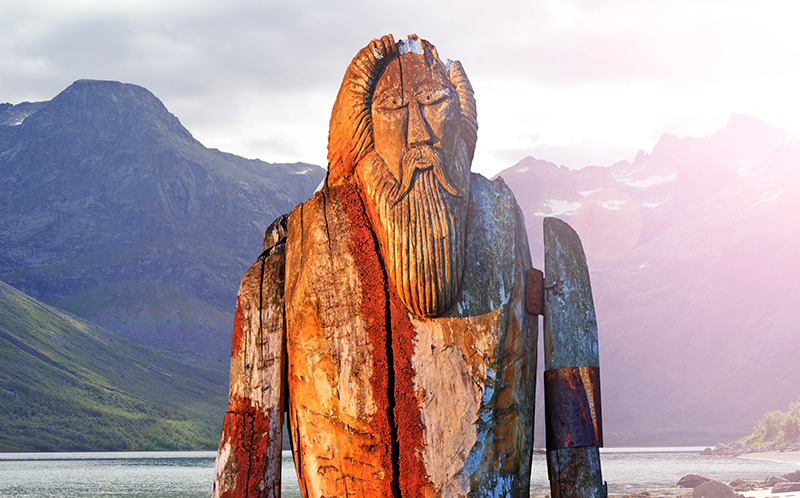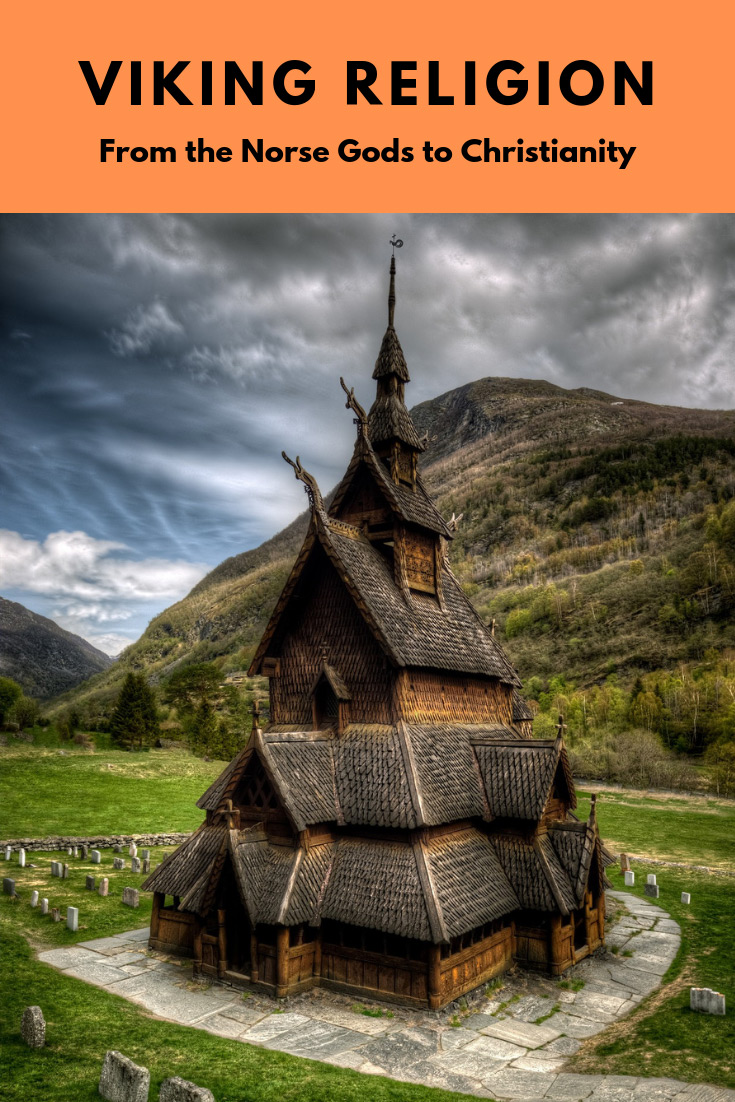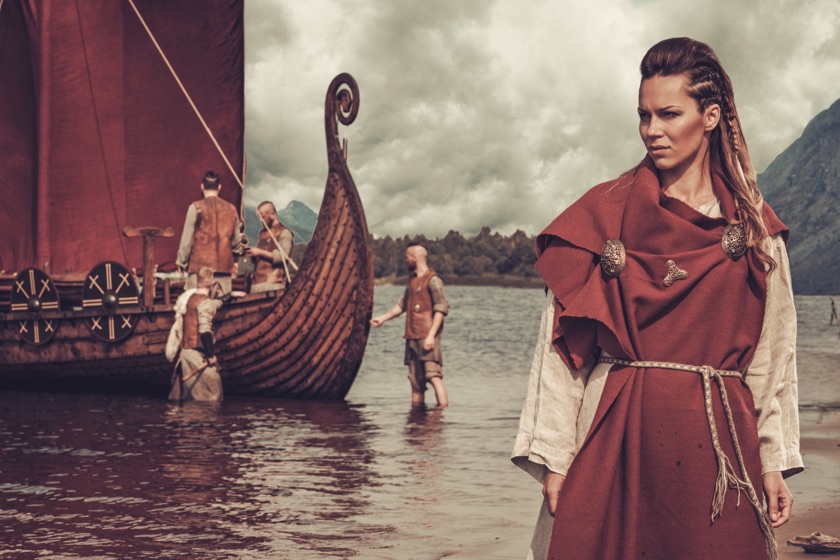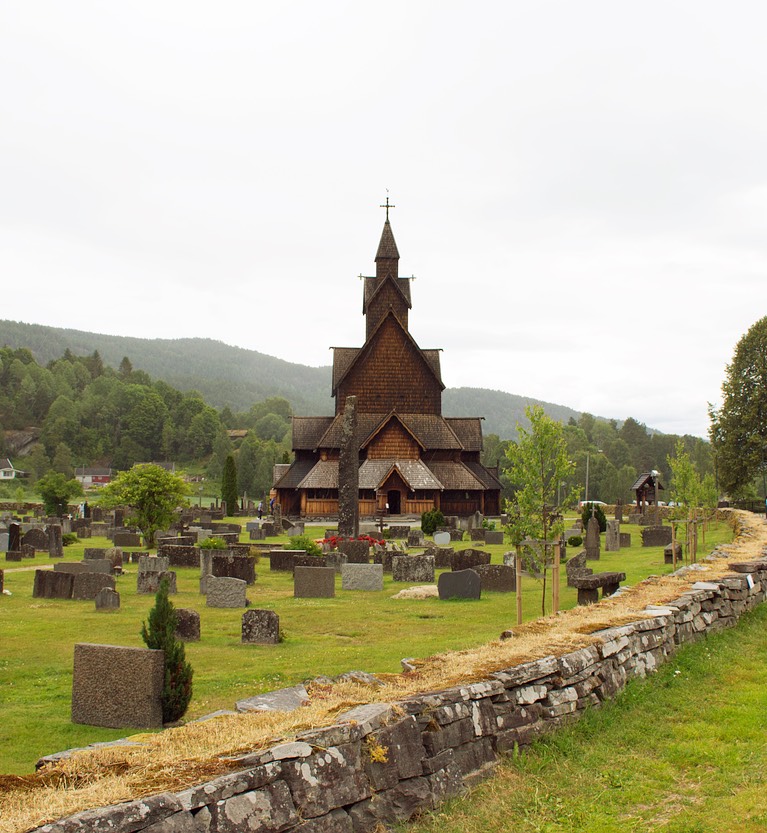Viking culture is intertwined with the stories of the Norse Gods. Yet it was also the Vikings that introduced Christianity to Norway. Here's everything you need to know about faith in the Viking Age.
Beginning more than 1,000 years ago, the Viking Age was a time of religious change across Scandinavia. The story is a long and complex one, but utterly fascinating at the same time.

Most modern scholars dismiss the depiction of the early Vikings as pagans who hated Christians. While they did hold pagan beliefs, most scholars now believe church attacks were nothing to do with religion. To the Viking, churches and monasteries were simply badly defended buildings with riches behind their walls.
It's known that the Vikings worshipped many gods. This may go some way to explain why some were so quick to adopt the concept of a Christian god. Let's look into what we know – and what we think – in more detail.
The Old Norse beliefs
There isn't a great deal of evidence of Old Norse paganism as very little was written down. Rooted in rituals and oral tradition, Norse mythology and beliefs were fully integrated into everyday life.

So much so, that it was seen as lifestyle rather than religion. The concept of religion as we know it today was only introduced to Scandinavia through Christianity.
Paganism is occasionally mentioned in viking sagas. However, such sagas were mostly written down in Iceland in the 13th-century, a couple hundred years after Christianity was introduced. Who knows how these more modern beliefs coloured the memories of history?
We do know that chieftains held a priest-like role, and that pagan worship likely involved the sacrifice of horses.
We also know that Vikings weren't one people. They lived in groups across a vast region. That said, it's likely that these groups saw themselves to a certain extent as one with other speakers of Old Norse across northern Europe. The pre-Christian belief systems shared many ecological, economic and cultural ties.
Like the Greeks and the Romans before them, the Vikings worshipped several gods. The best known is Odin, God of Wisdom, Poetry and War. Odin's son Thor—the God of Thunder—and the Norse goddesses of fertility Freyr and Freyja are other notable names.
The vikings sailed far and wide
The raids on the British Isles and elsewhere brought the Vikings into more regular contact with the Christian world. It's believed that the Vikings maintained their own beliefs after the raids, but came under political pressure to convert if more peaceful relationships were to be formed.

Christians were not supposed to trade with pagans. It is therefore believed that many vikings had to undergo some form of ‘temporary christening' in order to trade. It fell short of a full baptism, but showed a willingness to accept Christianity. That was enough to allow trade to take place.
When Christianity came to Norway
Most people know the story of Olav Tryggvason returning to Norway with Christianity in tow. But the religion had actually already spread to Scandinavia, albeit on a limited basis.
As early as the year 725, attempts were made to convert Scandinavia. That's when Anglo-Saxon St Willibrord led a mission to Denmark. Christians and worshippers of Odin and Thor lived side by side in the city of Hedeby. You could even buy both the Christian cross and Thor's hammer in the local jewellery shop.
Sometime around 950, Håkon the Good attempted to establish Christianity with his royal authority. It quickly became clear that he would lose the support of pagan chieftains if he insisted. That made the decision for him, so he abandoned the idea and sent his bishops back to the British Isles.
Olav Tryggvason returned to Norway in the summer of 995 intending to claim the throne. This was the moment that the wide-scale conversion truly began.
He brought with him many ships, plus several English priests and a bishop. When he landed on the island of Moster, he held the first official Christian mass in Norway. But it took around 35 years for the religion to be adopted in Norway.
Archaeological evidence suggests that Christianity was adopted gradually. Individual settlements would convert based on whether the local chieftain converted or not.
Better safe than sorry
The introduction of Christianity to Norway took a lot longer than many people realise. Whether the religions were seen as comparable, or people just didn't want to risk upsetting the old gods or the new gods, we'll never know.
Norway's historic stave churches feature elaborate carvings that mix together Christian and Viking symbols. That surprises many people considering the earliest remaining example was built as late as the 12th-century.
Many of the church roofs are lined with dragon carvings, while inside, intricately-carved portals retell ancient tales. Norway’s oldest stave church, Urnes, is a UNESCO World Heritage Site. The northern wall features a beautifully carved panel depicting a snake biting and being bitten by another animal.

The Romanesque basilica layout of the church along with the carvings make it an important example of the combination of traditional Norse symbols and medieval Christian influences.
Evidence of this lengthy crossover period can also be seen in cemeteries across the UK, where many Scandinavians settled. Some ancient gravestones carry both the hammer and cross.
Coins tell a story
Also in the UK, Viking era coins from York carry the name of St Peter. But look a little closer, and you'll see that the final ‘I' in ‘PETRI' is actually Thor's hammer!
The York Museum Trust explain how some coins from the rea provide an important insight into how Viking rulers worked with the Christian church, or didn't:
“By contrast Jorvik king Olaf Sihtricsson proclaimed his militant independence with coins bearing his title in the Old Norse language. Later Eric Bloodaxe, York’s last Viking king, used a Viking sword design. After he left the city it was never used again.”
A constant mix of old and new
In his book Nordic Religions in the Viking Age, Thomas A. Dubois summed up the situation nicely. Both for centuries prior to Christianisation and the centuries thereafter, communities and individuals developed their own versions of religion. This would include their own deities, rituals and world view that helped to explain their present situation.
New ideas would enter these contructs based on economic and cultural influences, while old ideas lingered. “Thus, Nordic religion at any given point in space or time could be seen as both an artifact of its past and a reflection of its present.”


Is there any information about what happens if a Viking woman refuses to get married?
If you waited too long man or woman there was stigma and would be called ” fleeing from penis/vagina” depending on the appropriate gender.
I am interested in finding out the history of greenery and trees as part of Scandanavian worship. When it started, why, and how important of a role did it play?
The internet is full of surmisings, but I am hard-pressed to find any real evidence.
You wont find ” Real evidence” Of anything on the internet.
Hence Norse Predated Christ.
Its best you Drop Your thoughts on Norse.
You dont Understand Us, We never Were called Vikings, But Vikingrs.
why els would The Devils Bible “Kings Book” Be about us,
our Germanic Past predating All Source of Religion on Earth.
My Norse Brother!
We were called various peoples before we were Norse. The length of time we were in Scandinavia pales in comparison to the centuries spent as Scythians let alone when we were Ostrogoths, Goths. Spiritual beliefs did in fact change with the language, although our ideas about the gods did carry through out our generations.
We were always the fiercest warriors. Christianity did not change that. In fact Christianity brought us together once again as a people in Europe as were once in Sythia, and or Palestine.
Our complacency and lack of keeping our peoples separate is ruining us.
Nicely said, Raven….
The Gods are alive and very well around the world, tho… and they’re stronger today then they were in the last 1000 years. Forced christianization falied, after all. Hail the Aesir.
Skall
Your so right! Hail the Aesir.
The historical reality seems to have been much humbler and more mundane.
I find it interesting how certain cultures/peoples already had an awareness of higher power(s) – something that can only come from within – or be revealed – prior to any knowledge/Creation of Christianity – which was developed after Christ died. Their Gods had the same mystical qualities as the single God depicted in the Old Testament. For centuries, we have been stripped of our original beliefs in a conquest for the power to “rule and reign” with wars still bounding all around us, with no effort to heed the words of Jesus. So I have to ask – why is Christianity the only way? Why is Jesus the must be? The way, the truth, the light – when faithful Christians die of Cancer when they believed that “by his stripes” they were healed? When Politicians claim to be Christians, but stir hate and divide? Where the media controls our thoughts and actions so much so that we lose a little bit of ourselves each day and teach our children to do the same. I would gladly go back to my pagan roots and honor the Gods of the earth, the wind, the seas – it is there where the honor of my creation exists – with love and compassion and the truth of who I really am.
are you just looking for something to worship or do you want the truth? Christianity was not formed after Christ. Its story begins in Genesis in the old testiment. You Criticize Christians as an excuse not to believe in Christ. Is this logical? Have you studied the vikings worship of their gods? It is very much worse, involving involuntary sacrifices of humans, etc. Seek truth, then decide
I appreciate your post.
I am of Norse heritage but we weren’t always Norse or Scandinavian. Although some may have arrived there earlier than others.
Research who we were before we were Norse. Ostrogoths, Goths. We came through the Pass of Israel in the Caucus(caucasion) Mountains and became the Scythians.
Herodotus the historian noted that Israel dwelled beyond the black sea and were too many to count. Israel wanted to be like the pagan nations and the God of the bible said ok and so they forgot Him directly. They became the Sycthians.
Christianity is the coming of the Messiah the Israelites always hoped for even in their paganism and did not realize this until they came to Great Britain. Britain means covenant people. Here we came out of our paganism and became Christian.
Our people are under attack because we wont obey Gods laws. Even His natural laws. We are guilty of being complacent. Having a lack of morals and boundaries.
Anyone can claim to be anything, its the fruit we need to look at.
No where does Christ/Yeshua/Jesus state “Christianity” is the only way. Rather He said He Himself is the Way, Truth, and Life. The term “Christian” was applied to church of Antioch by the Roman government at that time. My point being the term can be overused misapplied distorted.
Why is there no mention of Scotland within the Articles?
because…
The gods do not even know the fate of this. Destiny isn’t something one should even imagine they have control over. Let it go and listen to no man but follow yourself for each step shall be steady and true. Only one woman knows our individual demise and we can either look foolish faking our intellect on the matter or embrace the now and soak it up. Either way it all has meaning and is the way as ignorant and naive as it sounds yet I am but a man with no more understanding than the next so I digress.
I read repeatedly how Christianity was forced on the Norse. I’ve been watching secular documentaries which document how the Vikings attacked and pillaged the Monasteries taking the surviving Christians as slaves. Many Christians did it abandon their faith and practice even while enslaved. Intermarriage with practicing Christian believers led to the organic growth of the faith. Christian mysticism has a power of its own that I would guess challenged the mystical Norse practices. Christian mystics see, hear, and, follow directives from apparitions of Jesus, the Holy Spirit, etc. The fact that enslaved people did not capitulate to the Norse practice and were martyred in instances is some evidence of the enduring foundations of Christian religious experience.
Im Elizabeth Vandiver. I just got our DNA results. We are English Scottish whales Norway and Germany and Dutch, we were all over northern Europe and yes, we were Vikings. I need some of my Viking strong adventurous blood now, ,I’m having mobility issues. I will be appreciative of all info concerning Vikings.